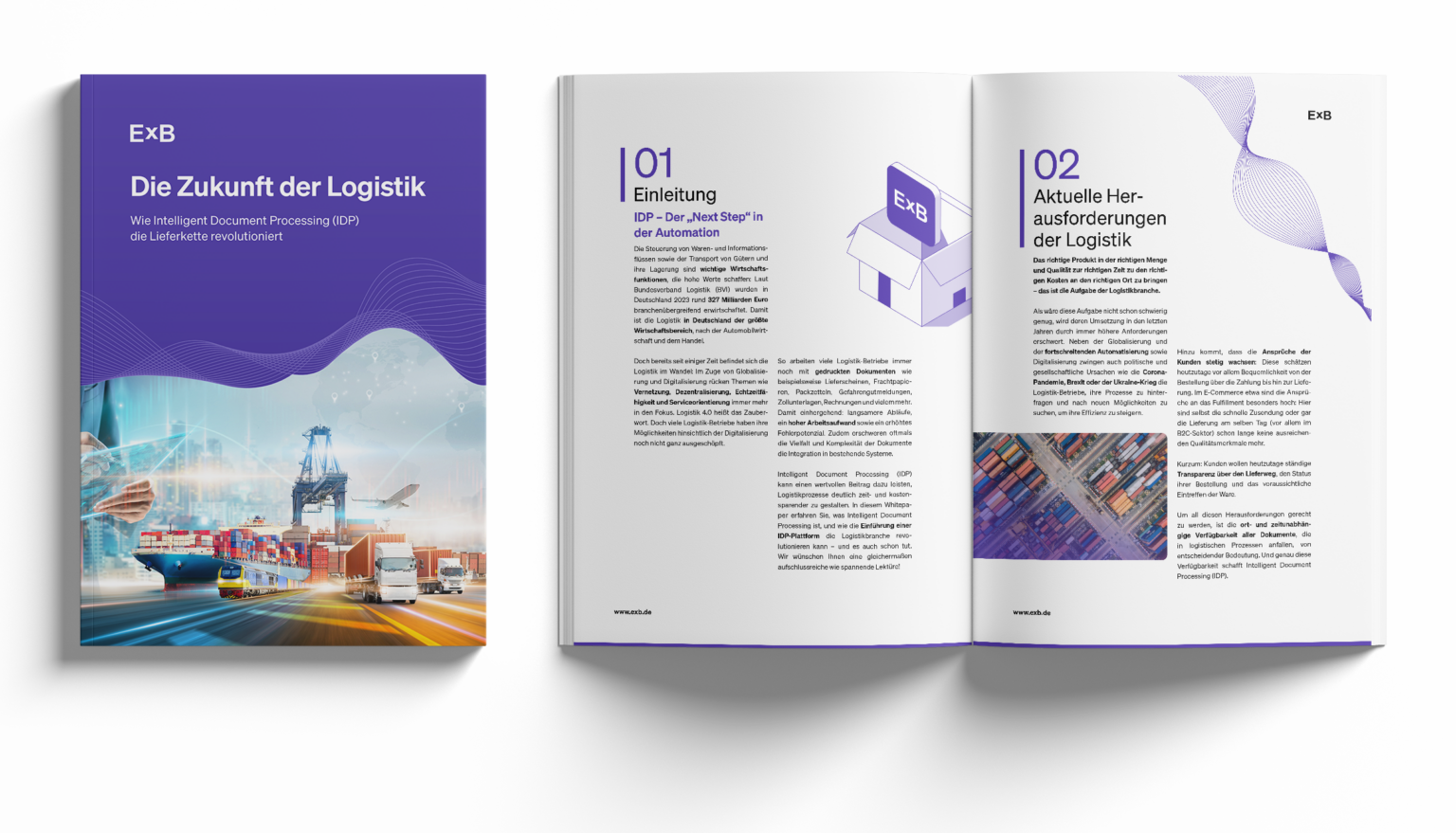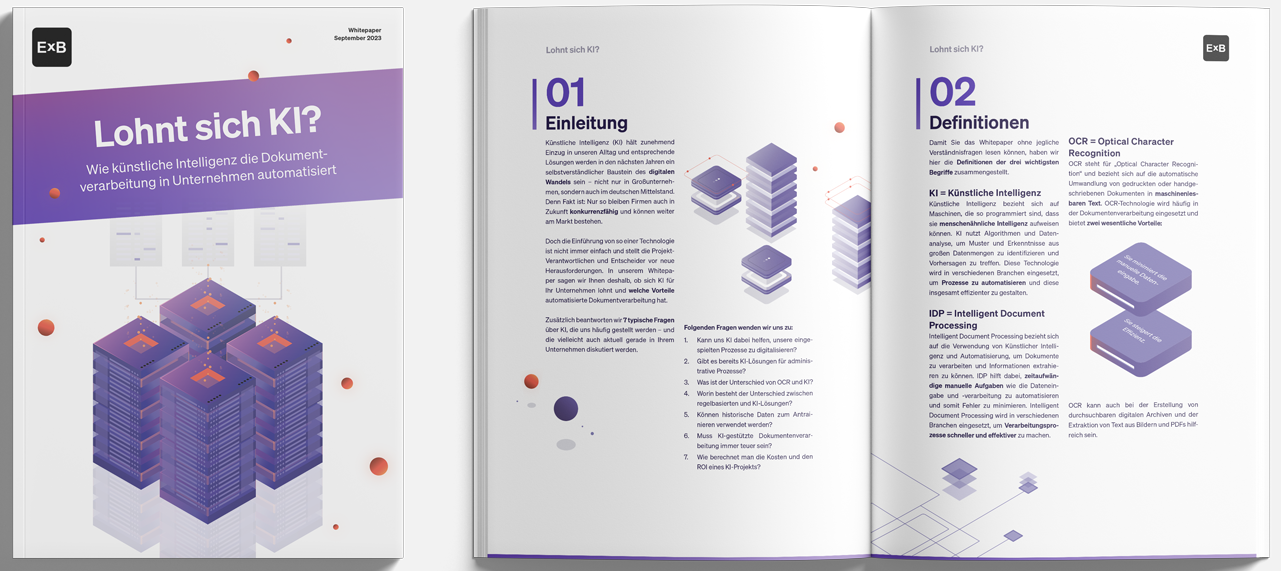Artificial Intelligence, Machine Learning, Intelligent Document Processing – in our blog we report on the latest developments, summarize current studies and explain exciting trends. Take a read, it’s worth it.

AI is playing an increasingly important role in today's business world. Companies are using it to optimize processes, make data-driven decisions, offer innovative solutions and push the boundaries of technological possibilities. The diversity and applications of AI, including generative AI and large-scale language models, reflect its potential. There are different types of AI with different functions and application areas. In this article, we look at the different types of AI and how and where they are being used.
In a world characterized by increasing competition and constant technological progress, increasing productivity in companies is more than just a goal - it's a necessity. But what exactly is productivity and why is it so important for companies in all sectors? This article takes a comprehensive look at the topic of increasing productivity and shows how Intelligent Document Processing (IDP) helps companies to increase efficiency and thus gain a decisive competitive advantage.
In the dynamic business world, digital transformation is more than just a buzzword - it is essential to remain competitive. Companies need to rethink traditional models and use digital technologies to automate processes and increase efficiency. This applies not only to internal processes, but also to interactions with customers. Digital transformation offers both challenges and opportunities for innovation and growth. What does this mean in concrete terms for your company and your industry? How can you manage this change and use successful examples?
Companies use a variety of AI applications to optimize their processes. Intelligent character recognition (ICR) and optical character recognition (OCR) are increasingly being used to process data efficiently. Both technologies extract data from different types of documents. It is important to understand the nuances and differences between ICR and OCR in order to successfully achieve data-driven goals. This article focuses on the functionalities and applications of ICR and highlights its impact on document process automation.
In modern organizations, capturing, distributing, filing, editing and archiving documents are indispensable process steps in daily business life. However, the time-consuming search for documents that have already been archived often leads to unnecessary delays and frustration. One solution that can help here is digital document management, for example in the form of a document management system (DMS). This not only optimizes processes and workflows, but also leads to a much more efficient working day.
In a world where technology is increasingly acquiring human-like capabilities, natural language processing (NLP) plays a crucial role. NLP is a branch of artificial intelligence (AI) and machine learning that aims to bridge the gap between human communication and computer-controlled processing. But what exactly do machine learning and NLP mean, how do they differ from each other and what similarities and dependencies are there?
Automation, cloud computing, robotics and artificial intelligence characterise the use of new technologies. Robotic process automation (RPA) in particular is growing due to its easy integration and applicability in various business areas. In contrast to physical industrial robots, RPA automates business processes and tasks with the help of software robots or bots. These emulate human interactions with the user interface and perform tasks in computer systems. RPA systems can automate repetitive, rule-based tasks that are normally performed by employees.
In the era of digital transformation, machine learning (ML) plays a key role in the evolution of information processing. ML, as a subfield of artificial intelligence (AI), embodies the combination of data processing and intelligent algorithms that enables computers not only to gain experience, but also to learn autonomously from it. This ability to grow through data and experience not only has far-reaching implications for the foundations of information technology, but also revolutionizes the approach to complex problem solving.
We live in an era of digitalization in which data and its importance for your company is constantly growing. Statistical data analysis methods can help to identify patterns and trends. This is crucial in order to use your data efficiently for your business purposes and to achieve your business goals. Data quality plays a decisive role here, as errors can influence data analysis results. Data cleansing and plausibility checks are important methods of data preparation to ensure the quality of your data.
Data plays a fundamental role in today's business world, which is why a comprehensive understanding of data is more important than ever in the age of digital transformation. A basic distinction can be made between three main types of data: structured, semi-structured (semistructured) and unstructured data. This article will focus on the latter type of data: As a pioneer in AI-based data processing of unstructured formats, we have summarised everything you need to know about this topic.
Workflow automation is the key to efficient business processes: The approach describes the use of technologies to automatize workprocesses. The technologies, which are often AI-based, enable the seamless integration, execution and monitoring of tasks and steps within a workflow. The main goal of workflow automation is to identify worktasks that can be automatied with tools. This leads to faster, more precise execution of tasks, which increases efficiency and productivity.
Data is considered the gold of our time, but its precise and adequate processing often remains unused. As part of artificial intelligence, cognitive computing refers to computer systems that are able to imitate or simulate human-like abilities. Cognitive computing offers valuable opportunities to improve and accelerate processes. As a pioneer in the field of process optimization with over 20 years of experience in the application of advanced AI technologies, we have summarized everything you need to know about the topic.
Optical Character Recognition (OCR) is a technology based on AI (Artificial Intelligence) that converts scanned documents into machine-readable characters. This reduces physical storage space and optimizes workflows. As a provider of a unique platform that uses OCR technologies, among other things, we have compiled comprehensive information on how OCR works and other aspects worth knowing about OCR for you.
Natural Language Processing is a subcategory of Artificial Intelligence: NLP enables machines to understand and generate human language. NLP deals with the interaction between human language and computers. It is about enabling machines to understand and process natural language (i.e. language generated by humans) in the same way that humans do. Find out everything you need to know about this topic in our guide.
ExB is your platform when it comes to Intelligent Document Processing. As a software provider with years of expertise, we therefore not only want to inform you about internal news, but also share interesting developments, trends and studies from the red-hot topic world around AI, IDP and Machine Learning with you. Subscribe to our newsletter now – you won’t regret it.






Kostenloser Download:
Erfahren Sie, wie Intelligent Document Processing (IDP) die Lieferkette revolutioniert.
Unser Whitepaper behandelt:
Laden Sie hier gleich Ihr kostenloses Whitepaper-Exemplar herunter und revolutionieren Sie Ihre Lieferkette mithilfe von KI!

Kostenloser Download:
Sieben typische Fragen über KI beantwortet:
Laden Sie hier gleich Ihr kostenloses Whitepaper-Exemplar herunter und erfahren Sie die Antworten auf diese Fragen!
